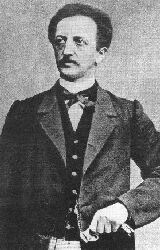| Profile | Major Works | Resources |
Ferdinand Lassalle, 1825-1864

German lawyer, leader of the socialist movement in Germany, founder of the SPD.
Son of a Jewish businessman from Breslau, Ferdinand Lassalle studied philosophy at Berlin, where he came into the Young Hegelian circle. It was in this milieu that Lassalle met and befriended Karl Marx (the sentiment was not quite reciprocated). In the upheavals of 1848, Ferdinand Lassalle became involved with the Neue Rheinische Zeitung and was briefly arrested for his activities in Dusseldorf. Subsequently earning his living as an attorney, Lassalle's earliest works (1858-1861) were primarily conventional works of literature, philosophy and law, but he remained involved in public affairs.
Ferdinand Lassalle did not adopt Marx's ideas but rather subscribed to the "State Socialist" doctrines of Rodbertus. Drawing on his Hegelian roots, Lassalle condemned the "liberal" perspective of government as a mere guarantor of law-and-order, arguing that government is (and has always been) an agent of social change, for better or for worse. It was consequently mere common sense to harness the State's power for social "betterment". So, rather than condemning private property as such (as more radical socialist did), Lassalle was keen to point out that the State socialism ought to merely "fix" the social ill-effects of capitalism.
A believer in Malthus's population doctrines, Lassalle argued that Malthusian wage-fertility dynamics ensure that workers will be forever condemned to subsistence wages unless they managed to also retain profit for themselves. It was Lassalle, incidentally who coined the term "iron law of wages" to describe the Classical theory. Lassalle's belief in the iron law seemed to "exempt" capitalists from direct blame for the plight of worker incomes.
However, unlike Rodbertus, Lassalle did not believe that it was enough to merely supplement capitalism with State redistributive schemes to raise workers' incomes. Rather, he primarily advocated the setting up new worker-run cooperative enterprises (with State-provided capital) to compete (and eventually replace) private capitalist enterprises. In this manner, workers would retain their own surplus value and the politically-contentious issue of income redistribution could be momentarily side-stepped.
In May, 1863, Ferdinand Lassalle formed the Allgemeiner Deutscher Arbeiterverein (ADAV, General Union of German Workers), the first German labor party. In a 1863 manifesto, Lassalle articulated two concrete goals for the movement: universal suffrage and the introduction of State-sponsored producer cooperatives. The opportunistic Prussian Chancellor, Otto von Bismarck, co-opted Lassalle's agenda and support, believing that the working class would be a good ally for him in his struggle against bourgois liberals. However, before anything came of this, Lassalle was killed in a duel over a love affair.
The division between Lassallians and Marxians continued for the next decade after his death. Finally, in 1875, at Gotha, Lassalle's party was united to the Marxist Socialdmokratische Arbeiterpartei led by Liebnicht and Bebel to form the single Sozialistischen Arbeiterpartei (SAP, the precursor of the modern Social Democratic Party, SPD). However, the resulting manifesto of the united party was more Lassallian than Marxian in content. Marx fulminated against Lassalle's doctrines in his Critique of the Gotha Program. The SPD's Gotha program was replaced in 1891 by the Erfurt Program, which brought it closer to orthodox Marxian lines.
Lassalle was highly influential on the German Historical School and the Marxist revisionist Eduard Bernstein (who wrote a biography of Lassalle in 1893). Lassalle's life is given a literary treatment in George Meredith novel, The Tragic Comedians.
|
Major Works of Ferdinand Lassalle
|
|
HET
|
|
Resources on Ferdinand Lassalle
|
All rights reserved, Gonçalo L. Fonseca
